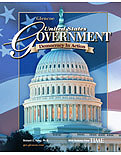
U. S. Government: Democracy In ActionChapter 7: Congress at WorkChapter OverviewsCongress' primary task is to review proposed legislation and make decisions accordingly. Chapter 7 explores the process for proposing, reviewing, and enacting federal legislation and identifies the factors that have an influence on congressional decisions. Section 1 introduces the various types of bills that are proposed to Congress and the process for approval. The types of bills introduced to Congress include private bills—those dealing with individual people or places, and public bills—those dealing with general matters that apply to the whole nation. A bill must pass through both houses of Congress before it can receive presidential approval. Section 2 deals with the high cost of running the national government. The Constitution grants Congress the authority to decide where this money comes from and how it is spent. Most of the money the national government uses comes from taxes. Without funding, the national government could not successfully carry out its many programs and services. Section 3 discusses the political pressures that members of Congress experience in the lawmaking process. Members of Congress must cast their vote on thousands of issues. Many factors such as political party pressures and constituent pressures to vote a particular way have an effect on their vote. Section 4 discusses the expectations that constituents have of members of Congress. Representatives do more than just debate issues in the best interest of their district. They assist constituents who are having trouble with a federal department or agency and act to get their district or state a share of federal money. |  |















